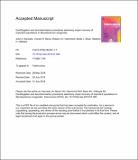Centrifugation and decontamination procedures selectively impair recovery of important populations in Mycobacterium smegmatis
Abstract
Diagnosis and treatment monitoring of patients with tuberculosis (TB) requires detection of all viable mycobacteria in clinical samples. Quantitation of Mycobacterium tuberculosis (Mtb) in sputum is commonly performed by culture after sample decontamination to prevent overgrowth by contaminant organisms. Exponentially growing cultures have cells that predominately lack non-polar lipid bodies whereas stationary cultures have a predominance of cells with non-polar lipid bodies. This may reflect rapidly growing ‘active’ and non-replicating ‘persister’ sub-populations respectively in sputum from TB patients. We investigated the effect of decontamination on culture-based quantitation of exponential and stationary phase cultures of Mycobacterium smegmatis in an artificial sputum model. Exponentially growing populations were between 89 and 50 times more susceptible to decontamination than stationary phase cultures when quantified by most probable number and colony forming units. These findings suggest that decontamination selectively eliminates the ‘active’ population. This may impair diagnostic sensitivity, treatment monitoring, and compromise clinical trials designed to identify new antibiotic combinations with activity against all mycobacterial cell states.
Citation
Kennedy , J A , Baron , V O , Hammond , R J H , Sloan , D J & Gillespie , S H 2018 , ' Centrifugation and decontamination procedures selectively impair recovery of important populations in Mycobacterium smegmatis ' , Tuberculosis . https://doi.org/10.1016/j.tube.2018.07.008
Publication
Tuberculosis
Status
Peer reviewed
ISSN
1472-9792Type
Journal article
Description
This work was supported by PreDiCT-TB (SMDO XEU-07).Collections
Items in the St Andrews Research Repository are protected by copyright, with all rights reserved, unless otherwise indicated.

